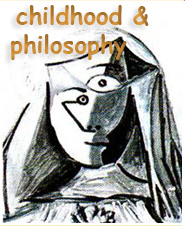pragmatism in matthew lipman and its influence in latin america
Keywords:
Filosofia para crianças, M. Lipman, Pragmatismo, América LatinaAbstract
The present article is an analysis of the initial reception of and later accommodation to Matthew Lipman's Philosophy for Children program in Latin America (LA), beginning with his major philosophical characteristics as a pragmatist, then tracing the way his thought and work influenced LA. Finally, an effort is made to elaborate on possible future relations between Lipman‟s ideas and the LA context. For those who are already familiar with the work of Lipman, the pragmatist path he followed seems to be easily recognized. Lipman adapts Peirce's concept of "community of inquiry" in developing his approach of Philosophy for Children; often he refers to the conceptual axis of the philosophy of John Dewey, and also uses the Th. Kuhn‟s concept of "normal science." In Lipman‟s philosophical proposal we can realize the close relationship between philosophy and education, which implies the necessary consideration of the consequent epistemological, ethical and political approaches between the two. In carrying these ideas into the LA context we note the implications of the Lipmanian program for the development of the tolerance and respect that is necessary in a world markedly diverse and plural, and which longs towards authentic democracy. We seek a future where everyone can participate effectively in decisions for the improvement of society, since everyone will be able to think in a reasonable and fair way, skilled in handling ideas and arguments, self- confident and individual and socially disciplined, knowing how to think well and how to judge with intellectual and moral responsibility. In LA, a critical understanding of the experiences that affect the reality of our various societies is necessary. The tension between a universal LA set of values and each of its individual societies manifests in multiple contradictions and a rich array of problems, which may serve to provoke the sense of wonder that Lipman tells us is at the heart both of childhood and philosophy, and that may lead us to those philosophical issues that are most relevant to our search for social and political transformation.Downloads
Download data is not yet available.
Downloads
Published
2012-02-08
Issue
Section
articles



